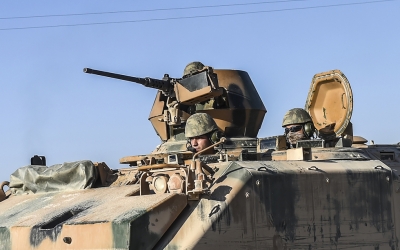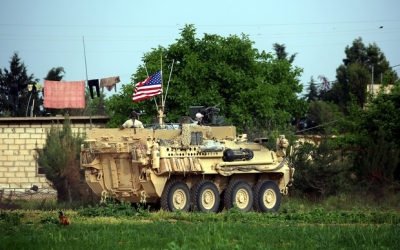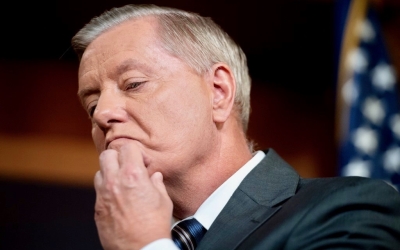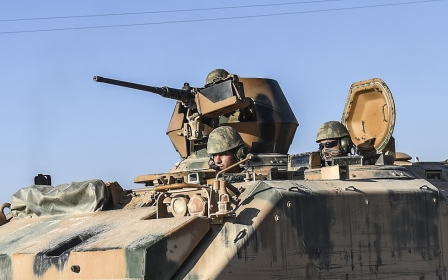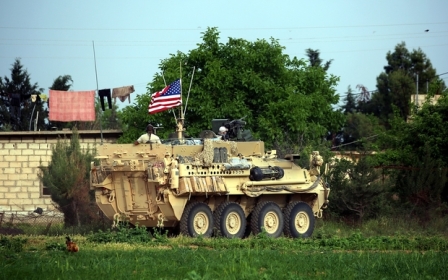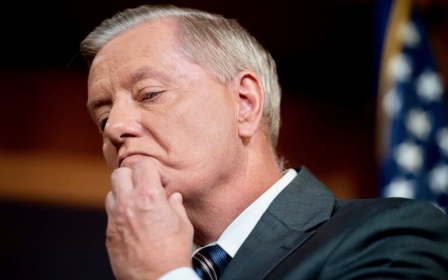Iran rejects Turkey's establishing of military posts in Syria
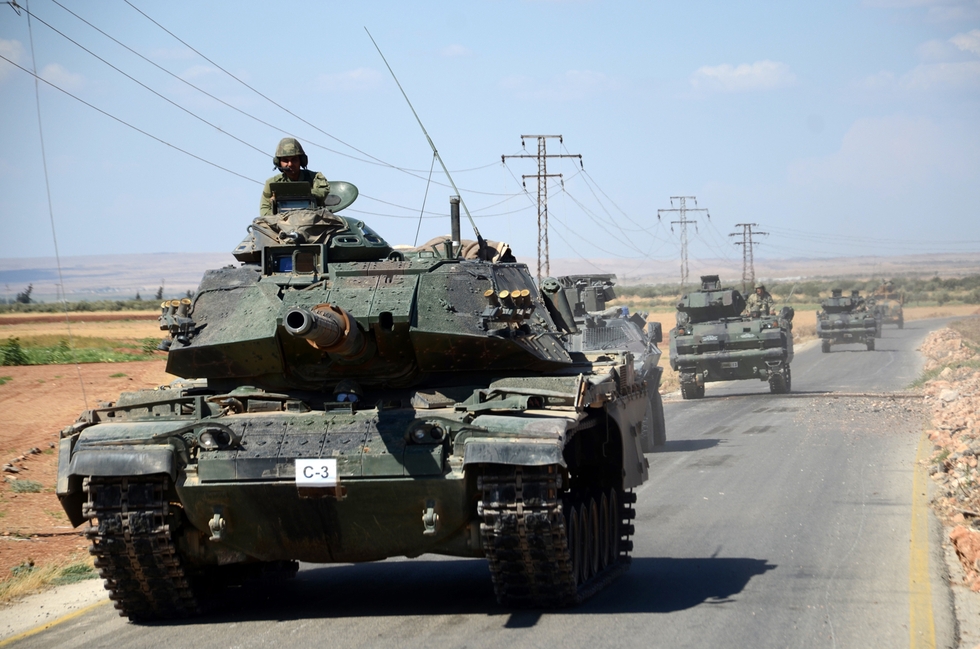
Iran rejects Turkey's establishing of military posts inside Syria, Iranian Foreign Ministry spokesman Abbas Mousavi said on Monday, adding that the integrity of Tehran's key regional ally should be respected.
"We are against Ankara's establishing of military posts in Syria... The issues should be resolved by diplomatic means... Syria's integrity should be respected," Mousavi told a weekly news conference, broadcast live on state TV.
On Thursday, Turkey agreed in talks with US Vice President Mike Pence to a five-day pause in an offensive into northeastern Syria, to allow time for the Kurdish fighters to withdraw from a "safe zone" Ankara aims to establish in Syrian territory along Turkey's border.
Turkish President Recep Tayyip Erdogan said on Friday that Turkey would set up a dozen observation posts across northeast Syria.
A close ally of Syrian President Bashar al-Assad, Iran has offered to engage Syrian Kurds, Syria's government and Turkey in talks to establish security along the Turkish-Syrian border following Turkey's military incursion into northern Syria to fight Kurdish forces.
Erdogan warned on Saturday that the offensive would continue and Turkey would "crush the heads of terrorists" if the deal was not fully implemented, while Turkey has insisted that it is the duty of Washington to ensure the withdrawal of the Kurdish YPG militia.
The Turkish president will visit Sochi for emergency talks with Putin on what steps to take next.
Turkey and Russia will discuss the removal of the YPG from the northern Syrian towns of Manbij and Kobane during the talks in Sochi, Turkish Foreign Minister Mevlut Cavusoglu said on Sunday.
In an interview with broadcaster Kanal 7, Cavusoglu said Turkey expected the YPG to be removed from areas where the Syrian government, backed by Moscow, has deployed in northern Syria.
He said Turkey did not want to see a single YPG fighter left in the safe zone at the end of the truce period.
Putin and Erdogan have forged close ties over defence and energy cooperation, as well as efforts to find a political solution in Syria, but Moscow has said the Turkish offensive was "unacceptable" and should be limited.
'Safe zone'
Turkey aims to establish a "safe zone" some 32km into Syria.
Erdogan said on Friday it would run for some 440km along the border, though the US special envoy for Syria said the accord covered a smaller area where Turkish forces and their Syrian rebel allies were fighting.
On Sunday, Kurdish fighters withdrew from the besieged Syrian border town of Ras al-Ain under the agreement brokered with the US.
"A convoy of approximately 55 vehicles entered Ras al-Ain and a convoy of 86 vehicles departed in the direction of Tal Tamer," the Turkish defence ministry said in a statement on Sunday.
The ministry simultaneously distributed pictures of the evacuation.
The ministry said: "There are absolutely no impediments to the withdrawal" of Kurdish forces and "the activities of exiting and evacuation from the region are firmly coordinated with the US counterparts".
Kino Gabriel, a spokesman for the Syrian Democratic Forces (SDF), also confirmed its fighters had left the town.
On Saturday, an SDF official had said Kurdish forces would withdraw from a 120km-long strip of Syrian territory along the Turkish border under the US-brokered ceasefire as soon as they were allowed out of Ras al-Ain.
US troops cross into Iraq
US troops have crossed into Iraq from Syria through the Sahela border crossing in the northern province of Dohuk, as part of the US withdrawal from the war-torn country.
Reuters video images showed armoured vehicles carrying troops into Iraq, with a Reuters cameraman saying he had seen more than 100 vehicles crossing.
An Iraqi Kurdish security source also told the news agency that US troops had crossed into the semi-autonomous Kurdish Regional Government area.
About 30 trailers and Hummers carrying heavier duty equipment crossed, with troops in cars coming through, the source added.
A second security source in Mosul also said US troops had crossed into Iraq from Sahela.
US Defense Secretary Mark Esper said on Saturday that all of the nearly 1,000 troops withdrawing from northern Syria are expected to move to western Iraq to continue the campaign against Islamic State (IS) militants and "to help defend Iraq".
On Monday, Esper said that keeping some US troops in parts of northeastern Syria near oilfields with SDF fighters to ensure the oil did not fall into the hand of IS or others was one of the options that was being discussed, but no decision had been made.
"We presently have troops in a couple of cities that [are] located right near that area, the purpose is to deny access, specifically revenue to ISIS (IS) and any other groups that may want to seek that revenue to enable their own malign activities," Esper told reporters in Afghanistan.
"There has been a discussion about possibly doing it (keeping some troops), there has been no decision with regard to numbers or anything like that," he added.
The US-backed truce in Syria aims to ease a crisis triggered by US President Donald Trump's abrupt decision earlier this month to withdraw all 1,000 US troops from northern Syria, a move criticised in Washington and elsewhere as a betrayal of loyal Kurdish allies who had fought for years alongside US troops against IS.
"The US withdrawal continues apace from northeastern Syria... we're talking weeks not days," Esper told reporters on Saturday, adding that the withdrawal was being carried out through aircraft and ground convoys.
"The current game plan is for those forces to re-position into western Iraq," Esper said, adding that they would number about 1,000.
He said the mission for those troops would be to "help defend Iraq" and carry out a counter-IS mission.
Iraqi scrutiny
Any decision to send additional US troops to Iraq is likely to be heavily scrutinised in a country where Iran has been steadily amassing influence.
It is unclear whether the US troops will use Iraq as a base to launch ground raids into Syria and carry out air strikes against IS.
The additional US troops would add to the more than 5,000 American troops already based in the country, training Iraqi forces and helping to ensure that IS does not return.
While Esper said he had spoken with his Iraqi counterpart and will continue to have conversations in the future, the move will likely be viewed with scepticism by some in Iraq.
Iraq is in the midst of a political crisis. Mass protests led to more than 100 deaths and 6,000 injuries during the week starting 1 October.
Iran's role in responding to the demonstrations has been another reminder of Tehran's reach in Iraq, where a sizeable number of former militia commanders are now members of parliament and support the Iranian agenda.
Middle East Eye delivers independent and unrivalled coverage and analysis of the Middle East, North Africa and beyond. To learn more about republishing this content and the associated fees, please fill out this form. More about MEE can be found here.


